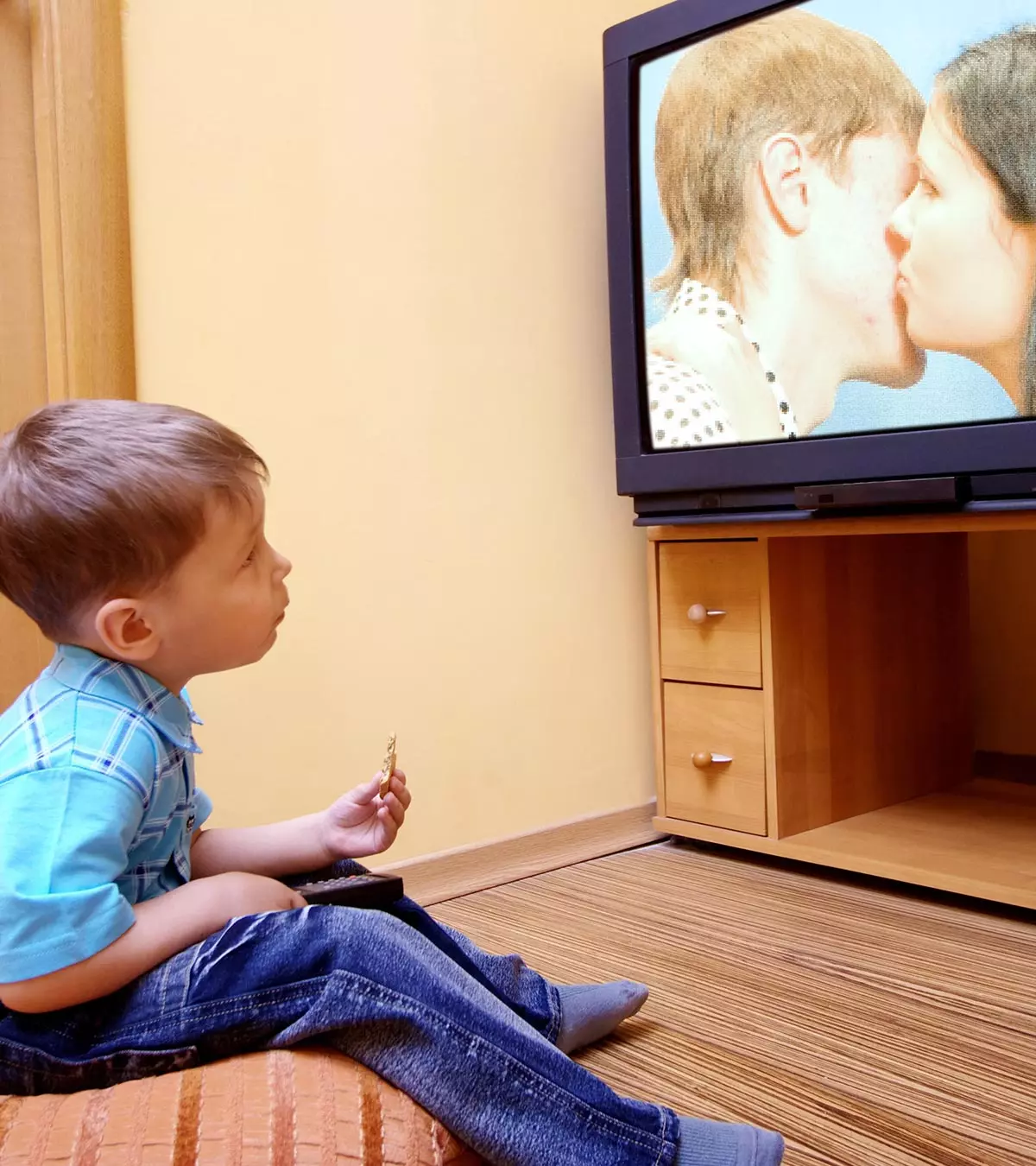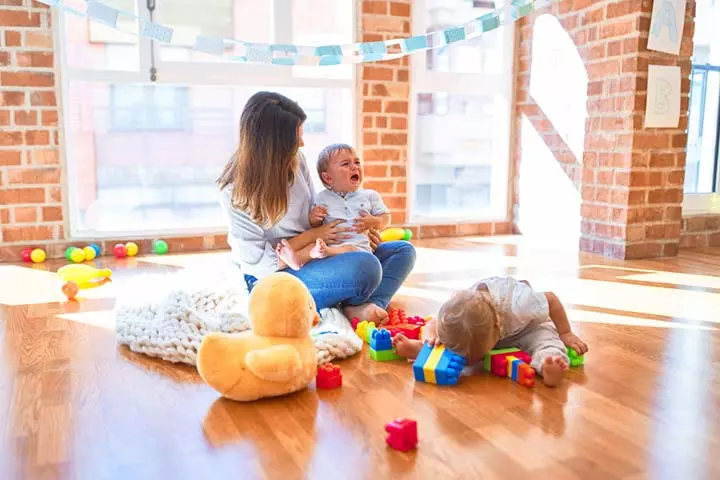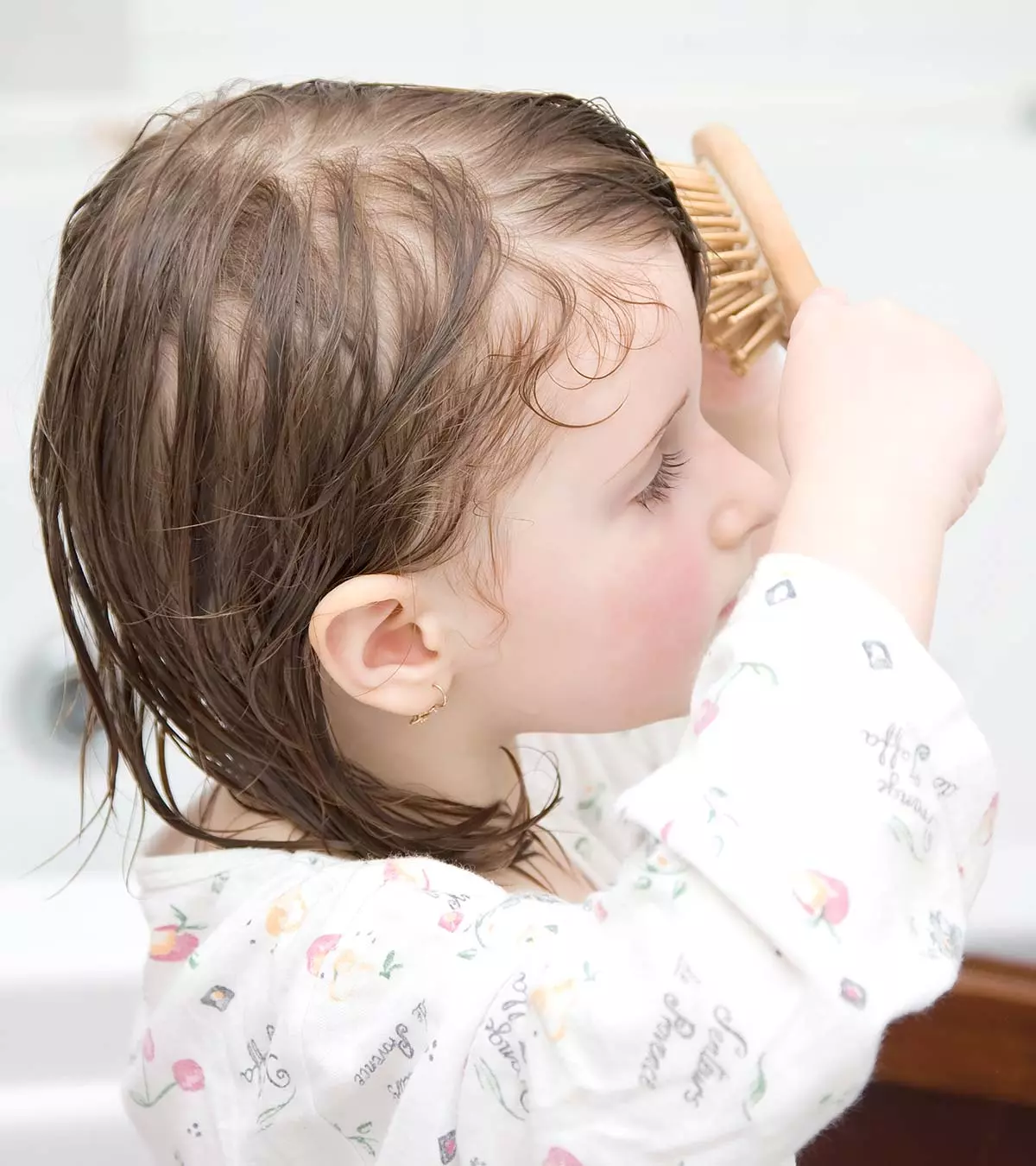
Image: Shutterstock
Many parents may wonder whether the drawbacks of watching TV for toddlers outweigh the benefits since many television shows aim exclusively to provide entertainment to the little ones. Although some shows are educational for toddlers, it may be inappropriate for them to be glued to the television and prefer it over playtime. Further, some toddlers may exhibit an unhealthy spike in their interest in watching TV. Some may also demand to watch TV more frequently and throw tantrums whenever the TV is switched off. Read this post to learn more about the negative side effects of watching TV on toddlers.
Key Pointers
- Toddlers who watch television before or during preschool are more likely to have developmental problems.
- Too much television can permanently alter your toddler’s brain structure and numb their thinking and cognitive abilities.
- Loud TV noises at home might also hinder your toddler’s communication ability.
- Prolonged TV exposure increases blood pressure risk in toddlers by 30-50%.
Is TV Always Bad For Your Toddler?

Experts recommend that toddlers and children aged two to five should have no more than one hour of daily screen time. While excessive screen time can be harmful, when carefully monitored for both duration and content, television can be a valuable tool for developing literacy and language skills (1).
However, early screen exposure could have potential drawbacks in childhood. Some studies state that toddlers watching TV (without screen limit) before or at preschool age are at a greater risk for developmental challenges and behavioral problems. Early exposure to TV has also been linked to attention disordersiCondition when children are hyperactive and have trouble controlling impulsive behavior and paying attention , issues with sleep and routine, and adverse effects on academic achievement and social and cognitive development (1). Furthermore, children who spend more than four hours a day before TV are more likely to experience obesity (2).
 Quick fact
Quick fact10 Side Effects Of Watching TV For Toddlers
The Centers for Disease Control and Prevention highlights that 47.5% of children aged two to five years spend more than two hours of screen time daily. Here are ten effects of TV on toddlers that can affect adversely:
1. It can permanently damage the brain structure of your toddler
According to research, watching too much TV can alter your toddler’s brain structure and functioning (3). If your toddler spends too much time watching TV, they will have a higher amount of gray matter near their frontopolar cortex. It is the area that is located at the front part of your toddler’s frontal lobeiThe largest lobe of the brain involved in motor function, problem-solving, memory, language, judgment, impulse control, social behavior, etc. . Such a condition can mean your toddler may have difficulty with verbal intelligenceiAbility to use and comprehend words to communicate effectively .
While your toddler watches TV, they may come across several interactive content and educational TV shows for toddlers. However, the pace of knowledge that your toddler gets from watching TV does not always vary or increase as per your toddler’s mental capabilities. It means your toddler may experience a damaging effect on their cognitive developmentiThe process through which a child learns, thinks, and understands the world as they grow. (3).
2. There are no real educational benefits for toddlers under 2 years

Until the time your toddler does not reach the age of two years, there is no real educational benefit in watching TV. Whatever your toddler watches on TV is pre-programmed and may adversely impact your toddler’s cognitive abilitiesiThe brain’s ability to acquire, process, store, and retrieve information (1). Your toddler may have a very distorted image of the real world from the education they receive from watching TV. They may also have problems relating to real people if they get used to watching virtual characters at an early age.
Dr. Sharifa N. Glass, MD, a board-certified pediatrician from Houston, Texas, says, “All high-quality shows available for children ages 18 months and older are not right for your child. To find the best shows, watch how your child interacts with the content. The best shows will elicit verbal responses (i.e., repeating words, singing, asking questions, etc.) or physical activity (i.e., jumping, dancing, etc.) from your child.”
3. It takes away precious time from your toddler
Getting used to watching TV will mean your toddler loses a lot of real-time that they could use in real situations. Being around real people and in real-time situations will help your toddler develop their various brain functions. Having quality family time with fun activities, such as reading a storybook with good moral lessons, can instill good values and improve the child’s creativity and imagination. When your toddler plays with other children their age and sees real things, they will learn much more than watching TV.
 Research says
Research says4. It numbs any initiatives
When your toddler is constantly exposed to TV, it can numb their thinking abilities and more (4). Certain TV shows may teach your toddler, but they can also dissuade them from taking any initiative themselves. As TV shows come with every idea and activity pre-programmed, there is not much scope for your toddler to develop critical thinking skills and take the initiative to think or do something.
5. Reading time gets encroached upon

The time your toddler spends watching TV takes up the time they could spend reading. Reading is recommended for toddlers from as early as they can hold a book, even earlier if possible. It will help your toddler perform better once they are at school. Reading will also help sharpen your toddler’s various cognitive and motor skillsiUse of muscles to make physical movements . It will encourage them to spend quality time, encourage their imagination, and improve their memory (4).
6. Too much TV can hamper speech
Most speech and language experts warn that being exposed to too much TV noise at home can hamper timely child development by affecting their speech. If your toddler is always exposed to background noise from the TV, they will have difficulty listening to other sounds and words. It can permanently hamper your toddler’s speaking abilities (5).
7. Learning with a teacher becomes difficult

If your toddler gets used to watching shows with high-quality educational programming on TV, it can clash with the way they learn from a real teacher. Many parents may wonder whether the drawbacks of watching TV for toddlers outweigh the benefits since many television shows are aimed exclusively at providing entertainment to the little ones. The shows your toddler watches on TV are always fast-paced and filled with animation. Once your toddler gets used to learning through these shows, they will find it difficult to concentrate on regular teaching techniques in the classroom. It can also become difficult for your toddler to pay attention to studying or learning at home.
 Point to ponder
Point to ponder8. Attracted towards negative influences
TV viewing has always been criticized for the negative impact it has on toddlers and children. Even though you regulate what your toddler watches, commercials or shows that do not have age-appropriate content can always come up. TV shows will not always match the sensitivities or values you may want your toddler to learn. For instance, you may not want your toddler to eat packaged foods, but TV shows or commercials may encourage this (6).
Emi Sano, a mother and blogger, shares how increasing screen time affected her child’s behavior. She says, “As my son grows up, we’ve been allowing more and more screen time. It doesn’t total more than two hours in a day. I’ve noticed, however, that the more screen time he has been getting, the worse his tantrums have become (i).”
9. It can make your toddler obese

Watching TV will take away play time from your toddler and may limit their time for physical activity and exercise (6). In most cases, your toddler may turn out to be overweight, even obese. Limiting screen time is crucial as toddlers who watch too much TV may start facing weight issues from an early age.
 Point to consider
Point to consider10. Increases Blood Pressure
If your toddler is exposed to TV viewing, it can harm their blood pressure by increasing the levels. According to a study, watching too much TV between the ages of two and ten years can put your toddler at a 30% increased risk of high blood pressure. Combined with lesser physical activity, it can further increase the risk factor by 50%.
Introducing TV time to children before the age of preschool can have serious impacts on your child’s health. However, following parental supervision and screen time guidelines while watching TV is considered safe. Many parents use TV as a babysitter or as a distraction. This pattern can cause adverse effects in the longer run. One-on-one interaction with parents, reading books, singing rhymes and poems, etc., has many benefits and can be included in their everyday routine. Also, encourage your toddler to watch educational shows during their screen time. Additionally, co-viewing with toddlers can encourage communication and interaction while watching, thus increasing the educational aspect of watching TV for toddlers.
 Point to consider
Point to considerMaking TV Time Productive For Your Toddler
Although eliminating TV exposure may be challenging, selecting toddler-friendly programs and managing screen time can make it a positive and educational experience. Here are some guidelines to ensure your toddler’s TV time is enriching and enjoyable (7):
- Prioritize TV shows that offer good-quality screen time, as it positively impacts learning and behavior in toddlers.
- Establish clear limits on your toddler’s TV time and decide on the best times of day for them to watch.
- Choose co-viewing-friendly programs by shortlisting shows that you find both tolerable and enjoyable.
- Avoid TV shows that have violent themes or promote antisocial behavior, as these can harm your child’s development.
- Prefer shows that foster messages and themes (such as dance or science) aligned with your values and preferences.
- Choose shows that match your child’s interests, like interactive songs if they love singing, to keep them entertained and actively engaged.
- Pick educational TV shows that help your child learn new words, facts, or ideas in an enjoyable and engaging way.
- Select shows, movies, and videos with positive messages, inclusive themes, and age-appropriate content, promoting emotional well-being in preschoolers.
- Be cautious about apps featuring ads, check privacy settings, and assess the potential addictiveness of shows to ensure a safe and balanced screen experience for your child.
Sharing her valuable insights with the Child Mind Institute, researcher Dr. Sarah Lytle advises parents to engage with their toddlers during screen time and choose age-appropriate entertainment shows. She says, “We need to understand and manage expectations regarding different circumstances. Media for entertainment is fine for kids, as long as the time spent is moderate and the content is suitable (11).”
Ways To Break Your Toddler’s TV Habit
While controlled TV viewing may not harm toddlers, it becomes problematic when it negatively impacts their routine and health. Here are some strategies to help manage your toddler’s screen time and encourage healthy screen habits (10) (12):
- Find out what they are addicted to: Identify what the child likes watching to choose suitable content and tailor screen time to their interests.
- Take it slow: Don’t cut screen time all at once. Gradually reduce it to make it easier for your child to adjust.
- Set up screen-free areas: Keep mealtimes, play areas, and bedrooms free of screens. This helps encourage family time and other activities.
- Watch together: If you can’t avoid screen time completely, watch TV with your toddler to monitor what they watch and for how long.
- Set a good example: Reduce your own screen time, too. Show your toddler there are other fun things to do.
- Distract with other fun activities: Engage your toddler in other activities they enjoy, such as sports, drawing, or reading, to keep them occupied.
- Create screen-free routines: Incorporate daily activities, like outdoor play or family time, as screen-free moments in your toddler’s routine.
- Offer rewards: Set goals to reduce screen time and reward your toddler with extra playtime or their favorite snack to help them achieve their goals.
Frequently Asked Questions
1. How much screen time is recommended for a two-year-old?
As per the American Academy of Pediatrics (AAP) recommendations, preschoolers can be allowed around one hour of educational programs along with a parent or caregiver (2).
2. Why do toddlers always want to watch TV?
Your toddler might be glued to the screen due to a lack of adult attention, interest in certain shows, or an enjoyable TV viewing experience. Sometimes, children may also become interested in the TV due to parental viewing. Recalling how her second child became drawn to the television Nina, a mother and blogger says, “After our second child was born, suddenly Netflix became everyone’s best friend. With so much of my attention on the baby, we fell into a habit of our toddler wanting to watch a show as soon as she woke up and never wanting to turn it off (ii).
3. Can too much TV cause speech delay in toddlers?
A few studies have shown that toddlers exposed to more than the recommended duration of screen time might have speech and language delays, as well as difficulties with language acquisition (5).
4. At what age should toddlers start watching TV?
The American Academy of Pediatrics recommends that children watch TV only after 18 months. Parents must introduce 18-month-olds to high-quality educational digital content only.
5. Can too much TV cause autism in children?
Research notes that children who watch TV for more than three hours a day might be affected by short attention spans, language delay, and hyperactivity. These symptoms may correlate with autism spectrum disordersiGroup of developmental disorders that affects a person’s ability to interact with others, learn, or behave (8). However, more research is needed to establish a definitive link between excessive TV watching and autismiDevelopmental disorder affecting social interaction, verbal and non-verbal communication .
6. What are the symptoms of too much screen time for children?
Too much screen time could interfere with the child’s daily activities. This withdrawal from daily life could be one of the symptoms of TV addiction. Other symptoms might include decreased motivation, frustration when withdrawn from TV, and lack of control over the TV time limits (9).
7. What can children do instead of watching TV?
Dr. Glass recommends these activities:
- Toy scavenger hunt: Draw a map of your home and hide items in locations on the map for children to find.
- Photo scavenger hunt: Make a list of items, shapes, or colors that children need to find and take a picture of.
- Math spoons: Write out a page of simple math problems and have young children solve them by counting out spoons.
- Puzzles: Provide age-appropriate puzzles for children to complete. Children as young as two years will enjoy puzzles.”
Infographic: Possible Effects Of Watching Television On Toddlers
With screens becoming an integral part of our lives, children are at risk of excessive exposure to televisions. An increase in screen time has several ill effects on a toddler’s physiological, socio-emotional, and psychological well-being. The infographic below details a few of the negative effects of binging on television and tips to combat them. Illustration: Momjunction Design Team
Illustration: Serious Defects Of Watching TV For Toddlers

Image: Stable Diffusion/MomJunction Design Team
The impact of television on children has always been controversial. Watch this video to gain insights from an expert on the effects television has on your child.
Personal Experience: Sources
MomJunction articles include first-hand experiences to provide you with better insights through real-life narratives. Here are the sources of personal accounts referenced in this article.
i. Let’s talk about screen time.https://emisanowrites.medium.com/lets-talk-about-screen-time-75eced76b14e
ii. We stopped watching TV for two years. This is what I learned.
https://raisingwildflowerkids.com/2018/11/11/we-stopped-watching-tv-for-two-years-this-is-what-i-learned/
References
- Screen time and young children: Promoting health and development in a digital world; (2017).
https://pmc.ncbi.nlm.nih.gov/articles/PMC5823000/#:~:text. - How Media Use Can Affect Kids.
https://kidshealth.org/en/parents/tv-affects-child.html - Hikaru Takeuchi et al.; (2015); The impact of television viewing on brain structures: cross-sectional and longitudinal analyses.
https://pubmed.ncbi.nlm.nih.gov/24256892/ - The Impact of Television (Media) on Child Development.
https://www.waldorflibrary.org/articles/318-the-impact-of-television-media-on-child-development - Tots toddlers and TV: The potential harm.
https://brainwave.org.nz/article/tots-toddlers-and-tv-the-potential-harm/ - Kamaruzaman Jusoff and Nurul Nadiah Sahimi; (2009); Television and Media Literacy in Young Children: Issues and Effects in Early Childhood.
https://files.eric.ed.gov/fulltext/EJ1065705.pdf - Good apps games TV shows movies and YouTube for children 2-5 years.
https://raisingchildren.net.au/preschoolers/media-technology/media/good-apps-games-movies-preschoolers - Donna Hermawati et al; Early electronic screen exposure and autistic-like symptoms.
https://www.ncbi.nlm.nih.gov/pmc/articles/PMC5849631/ - Kids and screen time: Signs your child might be addicted.
https://news.umich.edu/kids-and-screen-time-signs-your-child-might-be-addicted/ - Screen time and children.
https://medlineplus.gov/ency/patientinstructions/000355.htm - Can Screen Time Be Educational for Toddlers?
https://childmind.org/article/value-screen-time-toddlers-preschoolers/ - Babies need humans not screens.
https://www.unicef.org/parenting/child-development/babies-screen-time - Media Use by Children Younger Than 2 Years.
https://publications.aap.org/pediatrics/article/128/5/1040/30928/Media-Use-by-Children-Younger-Than-2-Years - Screens: Not for Babies!
https://healthysd.gov/screens-not-for-babies/
Community Experiences
Join the conversation and become a part of our nurturing community! Share your stories, experiences, and insights to connect with fellow parents.
Read full bio of Dr. Tashawna Stokes
- Dr. Sharifa N. Glass is a board-certified pediatrician and an International Board-Certified Lactation Consultant (IBCLC) practicing at The Vine Pediatrics and Lactation, a house-call concierge practice in Houston, Texas. She is also a clinical assistant professor at the University of Houston College of Medicine. Dr. Glass did her MD from Drexel University College of Medicine and pediatrics residency program from The University of Texas Health Science Center at Houston.
 Dr. Sharifa N. Glass is a board-certified pediatrician and an International Board-Certified Lactation Consultant (IBCLC) practicing at The Vine Pediatrics and Lactation, a house-call concierge practice in Houston, Texas. She is also a clinical assistant professor at the University of Houston College of Medicine. Dr. Glass did her MD from Drexel University College of Medicine and pediatrics residency program from The University of Texas Health Science Center at Houston.
Dr. Sharifa N. Glass is a board-certified pediatrician and an International Board-Certified Lactation Consultant (IBCLC) practicing at The Vine Pediatrics and Lactation, a house-call concierge practice in Houston, Texas. She is also a clinical assistant professor at the University of Houston College of Medicine. Dr. Glass did her MD from Drexel University College of Medicine and pediatrics residency program from The University of Texas Health Science Center at Houston.
Read full bio of Jessica Albert
Read full bio of Rohit Garoo
Read full bio of Ghazia Shah






















